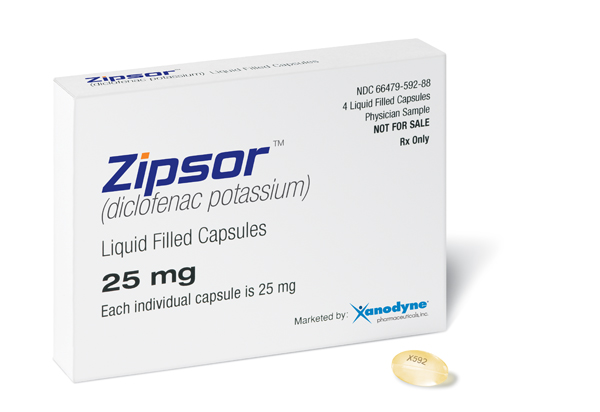Product
Zipsor (diclofenac potassium)
Approval Date
June 17, 2009
Release Date
N/A
Company
Xanodyne Pharmaceuticals, Inc.
Class
NSAID
Indication
Liquid Filled Capsules, for the treatment of mild to moderate acute pain in adults (18 years of age or older).
Active Ingredient
diclofenac potassium
Agency Roster
GSW
Gerbig Snell / Weisheimer (HCP Agency)
The JB Ashtin Group (Med Ed)
Marketing Strategy/Execution
Zipsor is the first NSAID to be approved based on the demonstration of safety and efficacy in two well controlled post-surgical bunionectomy clinical trials. It is the lowest available dose (25 mg) of any currently marketed diclofenac potassium product in the United States. Zipsor will also be the first and only prescription strength NSAID for oral administration available for the US market in a liquid-filled soft gelatin capsule.
“Demonstrating efficacy at a low dose not previously available to the market presents an important new therapeutic option to the physician and a significant opportunity for Xanodyne. It is also a significant milestone for our company as Zipsor represents the first approval to come out of our R&D organization. We are completing our launch preparations and our expectation is to have Zipsor on the US market within the coming months,” said Michael Valentino, president and CEO.
Physician Outlook
Zipsor, a new diclofenac product, will offer several advantages over currently marketed tablets, gels and patches. It will be the lowest dose prescription NSAID on the market, allowing physicians to meet FDA requirements to prescribe the lowest possible dose NSAID as first-line therapy, while still providing an easy to swallow soft gel capsule and quick onset of action.
—Geoff Penney, vice president, treatment tracker syndicated research, GfK Healthcare
Also in the Pipeline (courtesy of Adis R&D Insight)
Drug: Ereska
Manufacturer: Javelin Pharmaceuticals
Indication: Acute pain
Active ingredient: Ketamine intranasal
Phase: III
Drug: ROX 828
Manufacturer: Roxro Pharma
Indication: Acute pain
Active ingredient: Ketorolac intranasal
Phase: Preregistration
Drug: Ketotransdel
Manufacturer: Transdel Pharmaceuticals
Indication: Acute pain
Active ingredient: Transdermal ketoprofen
Phase: III
Source: Wolters Kluwer Health
Recent MM&M Coverage
Product News
The Top 75: GSW Worldwide
Pharmacology
Diclofenac potassium is a benzeneacetic acid derivative nonsteroidal anti-inflammatory drug (NSAID) that exhibits anti-inflammatory, analgesic, and anti-pyretic activities. The mechanism of action of diclofenac is thought to involve inhibition of the cyclooxygenase (COX-1 and COX-2) pathways, as well as prostaglandin synthetase inhibition.
Clinical Trials
Two multicenter, randomized, double-blind, placebo-controlled, parallel-arm, multiple-dose clinical trials were conducted to assess the efficacy of Zipsor in patients with pain following bunionectomy with osteotomy. Patients with a pain intensity rating ≥4 (on a 0–10 numerical pain scale) were randomized to receive an initial dose of Zipsor or placebo, followed by a remedication dose when requested by the patient, and then dosed every six hours over four days. Pain intensity was recorded at 3 and 6 hours postdose during the fixed dosing period. In both studies, patients treated with Zipsor had a lower mean pain intensity score over the 48-hour inpatient period following the first remedication dose. Across the clinical trials, the median time to onset of pain relief in patients treated with Zipsor was less than one hour.
Adverse Reactions
GI upset, abdominal pain, dyspepsia, dizziness, headache, somnolence, pruritus, rash (discontinue if occurs), increased sweating; GI ulcer/bleed, elevated liver enzymes (discontinue if hepatotoxicity develops), blood dyscrasias, renal papillary necrosis. See literature re: risk of cardiovascular events.
Adults
≥18yrs: 25mg 4 times daily.
Children
<18yrs: not recommended.
Contraindications
Aspirin allergy. Coronary artery bypass graft surgery.
Precautions
Not bioequivalent to other forms of diclofenac. Bovine protein sensitivity. Hypertension; monitor. CHF. Edema. Asthma. History of ulcer disease or GI bleeding. Bleeding disorders. Dehydration. Monitor blood, hepatic, and renal function in chronic use. Elderly. Debilitated. Pregnancy (Cat.C: <30 weeks gestation; Cat.D: ≥30 weeks gestation: avoid). Nursing mothers: not recommended.
Interactions
Avoid aspirin. May potentiate protein-bound drugs (eg, hydantoins, sulfonamides, sulfonylureas). May antagonize ACE inhibitors, diuretics. Increased risk of GI bleed with oral corticosteroids, anticoagulants (monitor), alcohol, smoking. Methotrexate excretion reduced. Increases lithium levels. Increased nephrotoxicity with cyclosporine. Caution with other hepatotoxic drugs (eg, acetaminophen, certain antibiotics, antiepileptics).








